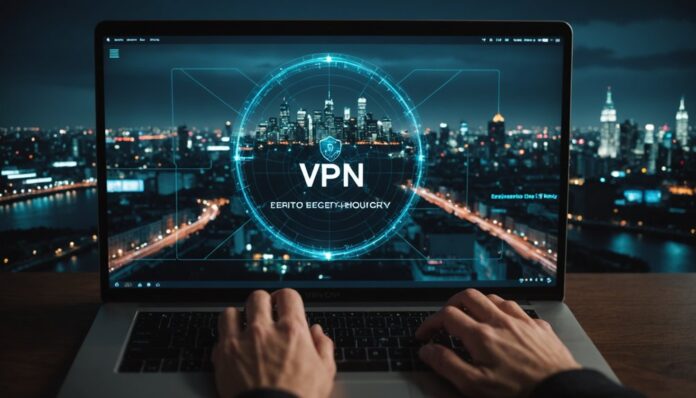A VPN, or Virtual Private Network, is a technology that creates a secure connection between a device and the internet, masking the user’s IP address and protecting their activities from prying eyes. With growing concerns over online security, many are turning to VPNs for enhanced privacy, especially on public Wi-Fi networks. But what are the benefits and limitations of using a VPN, and how does one choose the right provider?
Highlights
- A VPN, or Virtual Private Network, secures internet connection and protects user data through encryption and IP masking.
- Using a VPN provides enhanced online privacy and security, especially on public Wi-Fi networks vulnerable to threats.
- VPNs come in different types, including remote access and site-to-site, catering to various user needs and organizational structures.
- When choosing a VPN, consider provider reputation, strong track record, and pricing plans that fit specific needs and budgets.
- Despite potential drawbacks, such as slower speeds and connectivity issues, VPN benefits make it a valuable tool for a safer online experience.
How a VPN Works
Utilizing advanced encryption protocols, a VPN creates a secure tunnel between a user’s device and a VPN server, shielding online activities from prying eyes.
This secure connection guarantees that all data transmitted between the device and the VPN server remains confidential and protected from interception. The encryption protocols used by the VPN scramble the data, making it unreadable to anyone attempting to intercept it.
This emphasizes the importance of data privacy, as users can rest easy that their online activities are not being monitored or recorded.
The VPN server then forwards the encrypted data to its final destination, masking the user’s IP address and location. By doing so, the VPN effectively safeguards the user’s online identity and protects their data from unauthorized access.
Benefits of Using a VPN
As the internet becomes increasingly intertwined with daily life, the benefits of using a VPN have become more apparent. One of the primary advantages of a VPN is its ability to provide users with enhanced privacy protection.
By encrypting internet traffic and masking IP addresses, VPNs prevent third parties from accessing sensitive information. This safeguard is particularly vital for individuals who frequently use public Wi-Fi networks, which are notoriously vulnerable to cyber threats.
Additionally, VPNs contribute to overall internet security by shielding users from malware, phishing attacks, and other forms of cyber exploitation. By utilizing a VPN, individuals can considerably reduce the risk of their personal data being compromised, thereby ensuring a safer and more secure online experience.
Types of VPNs
While many people are familiar with the general concept of a VPN, there are actually several types of VPNs, each with its own unique characteristics and uses.
Two of the most common types of VPNs are remote access VPNs and site-to-site VPNs. Remote access VPNs allow individual users to connect to a remote network, such as a company’s network, from a different location. This type of VPN is often used by employees who need to access company resources while working remotely.
Site-to-site VPNs, on the other hand, connect two or more networks together, allowing them to communicate with each other securely. This type of VPN is often used by companies with multiple locations that need to share resources and data.
Choosing the Right VPN Provider
Now that the different types of VPNs have been examined, the next step for individuals and companies looking to employ this technology is to select a suitable VPN provider. This involves researching and evaluating various providers based on key factors.
Provider reputation is essential, as it guarantees the VPN service is reliable and trustworthy. A reputable provider will have a strong track record of protecting user data and maintaining network uptime.
Pricing plans are also an important consideration, with options ranging from free to subscription-based models. Individuals and companies must weigh the costs against their specific needs and budget.
Setting Up and Using a VPN
Once a suitable VPN provider has been selected, the next step is to set up and configure the VPN. The VPN setup process typically involves downloading and installing the VPN software or app, creating an account, and setting up payment information.
After setup is complete, the user can launch the VPN and connect to a server. VPN usage is relatively straightforward, with most providers offering a user-friendly interface that allows users to easily switch between servers and toggle the VPN on and off.
Many providers also offer additional features, such as automatic connection and kill switches. By following these steps, users can guarantee a secure and private online experience. Proper VPN setup and usage are essential to maximizing the benefits of a VPN.
Potential Drawbacks and Limitations of VPNs
Despite the numerous benefits of using a VPN, there are potential drawbacks and limitations that users should be aware of. One of the primary concerns is the impact on data speed, as VPNs can sometimes slow down internet connections.
Connectivity issues can also arise, particularly if the VPN server is experiencing technical difficulties. Additionally, some users may have privacy concerns, as VPN providers may collect and store user data.
Moreover, VPNs can occasionally affect user experience, such as when certain websites or services block VPN traffic. There may also be legal implications to take into account, as some countries restrict VPN use.
Finally, service costs can be a factor, as some VPN providers charge subscription fees. These limitations highlight the importance of carefully evaluating a VPN before using it.
Conclusion
Employing a VPN is a viable option for individuals seeking to enhance their online security and protect their sensitive information. While VPNs offer numerous benefits, including improved privacy and data protection, it is essential to contemplate factors such as provider reputation, speed, and potential legal restrictions. By understanding the mechanics and limitations of VPNs, individuals can make informed decisions about whether or not to employ this technology to safeguard their online activities.

